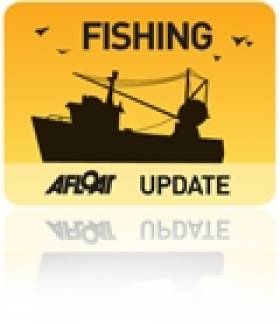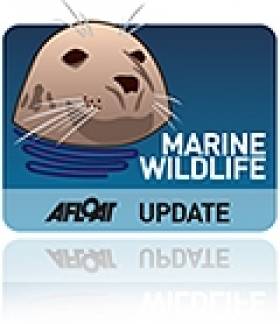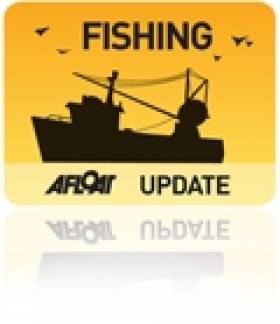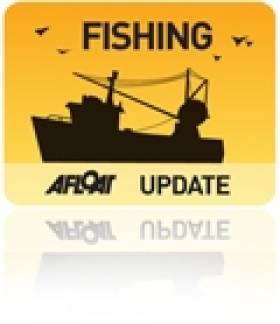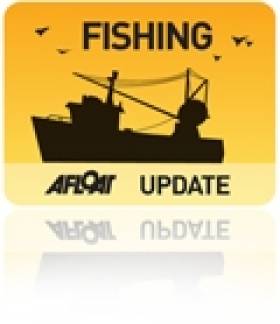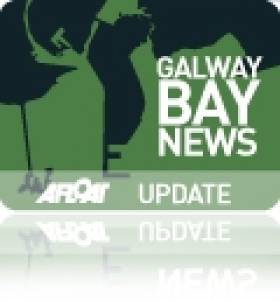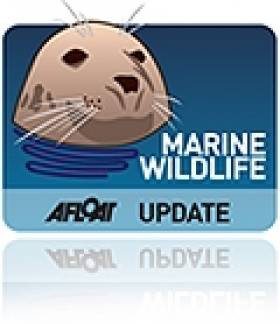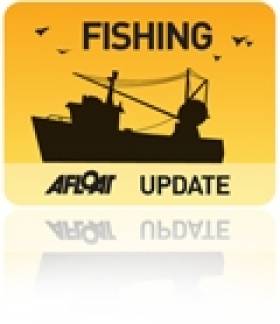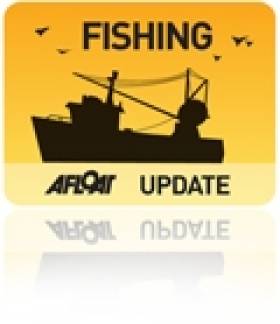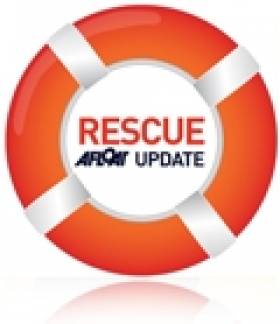Displaying items by tag: Fishing
Video of Sinking NI Trawler
#sinking – Dramatic footage of the sinking of the Ardglass-registered prawn trawler Snowdonia that sank last Tuesday has emerged on youtube.
The video shows the final moments of the trawler and how properly donned lifejackets kept two crewmen afloat.
Captain Stephen Kearney and a crewman are seen clinging to the side.
Their terrifying video shows how, after scrambling from the plummeting boat, one of the men looks to be sucked below the water — before mercifully resurfacing.
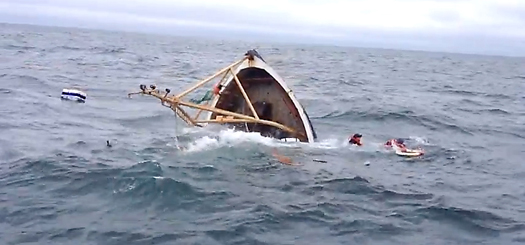
The two crew takes to the chilly water of the Irish Sea as the trawler goes down
The pair battle their way clear of the swirling danger zone before brave crew on the Tribute drag them to safety. Read more in the Irish Sun here.
The men were airlifted (see video below) to Daisy Hill Hospital in Newry after another fishing vessel, the Tribute, recovered them from the water and raised the alarm.
Conference Calls On UK Govt to 'Save Our Irish Sea'
#MARINE WILDLIFE - Marine experts are calling on the UK public to pile pressure on their government to create Marine Conservation Zones (MCZs) to help protect and restore marine wildlife in the Irish Sea and around the British coast.
The Living Seas North West Conference in Cumbria recently was a call to arms for marine experts and the public to join forces to protect the oceans.
And organisers the North West Wildlife Trusts used the event to press support for nature reserves in the Irish Sea as part of a UK-wide campaign by The Wildlife Trusts for 127 MCZs around the United Kingdom.
Callum Roberts, Professor of Marine Conservation at the University of York, described areas off the Isle of Man which have never been dredged as “carpeted with life”.
He said: “In the 19th century the Irish Sea bed was crusted with oysters. Today it is not just a sea different in the quantity of the wildlife it is different in the quality of the habitats in which that wildlife lives.”
Prof Roberts described how a study showed that dredging to catch 28,000 prawns also caught 12,000 other fish, most of which were thrown away. He also spoke of dives where he has seen the seabed damaged in huge areas by trawling.
“Over-fishing is not the only thing going on in the oceans," he said, "they are also affected by climate change and pollution. Our seas are changing faster than at any other time in human history.”
Prof Roberts said he was not against fishing, but that conservationists and the fishing industry need to find some common ground. “The prosperity of wildlife and the fishing industry depend on it," he said.
Meanwhile, The Wildlife Trusts marine protected areas manager Richard White spoke about the problems caused "by all the things that human activity is doing wrong".
He added: "We are trying to increase the resilience of our marine wildlife. The critical part is that we are doing this by trying to create Marine Conservation Zones.”
Pollution was highlighted by TV star and diver Paul Rose and Caroline Salthouse of the North West Coastal Forum.
“A huge problem is ocean debris," said Rose. "In 43 years of diving I am beginning to see more plastic and less fish. It is an issue that we must use to get people engaged in what is going on in our seas.”
Salthouse called for the public not only to sign the Wildlife Trusts’ new 'Petition Fish', but also to write to the British government as individuals.
More details about the Marine Conservation Zones and Petition Fish can be found at www.wildlifetrusts.org/living-seas
Irish Fishing Opportunities Next Year in the Atlantic and North Sea
#fishing – Irish fishermen may get additional fishing opportunities in 2013 according to am EU Commission proposal this afternoon.
The Commission has proposed increased levels of total allowable catch (TAC) for certain fish stocks in the Atlantic and the North Sea. In line with scientific advice, the Commission proposes to increase or maintain the TACs for 16 stocks (including certain stocks of herring, cod, whiting and sole), and reduce them for 47 stocks. Today's proposal sets levels of TAC for stocks managed exclusively by the EU.
The Commission's ultimate goal and one of the pillars of the on-going Common Fisheries Policy (CFP) reform is to have all stocks fished at sustainable levels, the so-called Maximum Sustainable Yield (MSY), by 2015. Whenever possible, scientists advise on how to bring the stocks to MSY levels. This year, the so-called "MSY advice" could be issued for 20 stocks (compared to 12 last year). This is a marked improvement as far as the availability and quality of scientific data are concerned.
Maria Damanaki, European Commissioner for Maritime Affairs and Fisheries, said: "we have to think long-term. European fishermen face a bleak future without sustainable, healthy stocks. Thanks to long-term management a number of stocks in the Atlantic waters are already fished at MSY levels. But at the same time 47% of stocks are still overfished. These facts support the Commission's vision for the CFP reform."
Details of the proposals
According to scientific advice, Norway lobster in the West of Scotland, plaice in the Eastern Channel, cod and sole in the Celtic Sea, and sole in the Western Channel are at MSY levels and the Commission proposes to raise or maintain their TACs.
At the same time, cod stocks in the Irish Sea and the Kattegat continue to be in a poor state, and the poor data hampers the management of these stocks. Sole in the Irish Sea is at extremely low levels and the Commission proposes to stop the direct fisheries and minimise the by-catches. MSY advice for haddock in the Celtic Sea and sole in the Bay of Biscay demands considerable TACs cuts, so that the stocks can be brought to MSY levels. Cod and whiting in the West of Scotland, subject to extremely high rates of discarding, continue to be in a very poor state and well below safe levels.
For more than 30 stocks where data is limited, the Commission has followed the direction recommended by the International Council for the Exploration of the Sea (ICES), and proposed cutting the TAC by 20%, in light of recent trends observed in these stocks, and on precautionary considerations.
Background
The present proposal concerns only the 83 stocks for which the TACs are decided by the EU alone. A second proposal will deal with the stocks for which the fishing opportunities are set in the context of Regional Fisheries Management Organisations (RFMOs) or consultations with third countries (shared stocks). It will be tabled later this autumn when some of the results of those international negotiations become available.
The proposed catch limits are based on the scientific advice from the International Council for the Exploration of the Sea (ICES) and the Scientific, Technical and Economic Committee for Fisheries (STECF). Stakeholders were also consulted, based on the Commission's Consultation document from June (IP/12/584).
Useful links
· TACs and quotas: http://ec.europa.eu/fisheries/cfp/fishing_rules/tacs/index_en.htm
· Scientific advice: http://ec.europa.eu/fisheries/cfp/fishing_rules/scientific_advice/index_en.htm
· Multiannual management plans: http://ec.europa.eu/fisheries/cfp/fishing_rules/multi_annual_plans/index_en.htm
· Map of fishing areas: http://ec.europa.eu/fisheries/documentation/publications/cfp_factsheets/fishing_areas_en.pdf
EU Fisheries Fund Allocation Deal Reached Today
Agreement on how a fisheries fund of approximately €6 billion will be allocated among EU Member States was reached in Luxembourg today following two days of negotiations at the EU Agriculture and Fisheries Council.
Minister for Agriculture, Food and the Marine, Mr. Simon Coveney T.D has been making the case to maximise Ireland's access to the fund which will provide significant funding to the seafood sector over the period 2014-2020, and enhance growth and jobs in this vital part of the economy.
In previous years Ireland's allocation from similar funds has been lower than warranted according to Minister Coveney who has been fighting to increase Ireland's share and deliver support to a sector which has the potential to create further jobs and assist in Ireland's economic recovery.
Not for the first time, the Fisheries Council worked through the night to come to a final compromise on the way in which funds will be spent to develop a competitive yet sustainable fishing industry. The fund, which will be used to support the new Common Fisheries Policy, (CFP) can be used for fleet modernisation, safety equipment, aquaculture development, adding value through processing, in addition to investment in new fishing gear to more effectively target stocks and assist in the reduction of discards.
Speaking early this morning, Minister Coveney stated that "The Irish seafood industry is a hugely important part of the economy, providing employment for more than 10,000 people. It is my job to drive a hard bargain on behalf of fishermen and their families but also to put a policy in place which will protect and build our fish stocks. Negotiating access to finance through the CFP is essential to that effort"
SFPA Facilitates Trade in Irish Fishery Products to China
#SFPA – The Sea-Fisheries Protection Authority (SFPA) held a bilateral meeting on seafood exports from Ireland to China today with key representatives from the General Administration of Quality Supervision, Inspection and Quarantine (AQSIQ), the organisation that carries out the import controls in China. The meeting took place at the SFPA's head office in the National Seafood Centre in Clonakilty, Co Cork.
In general terms, the meeting emphasised the assurances provided by official controls carried by the SFPA. Key topics discussed involved: risk assessments; health certification; certificate of origin, amongst others. A review of the Memorandum of Understanding then took place at the Department of Agriculture, Food and the Marine. Representatives from AQSIQ and the SFPA then proceeded to the National Seafood Centre at Bord Iascaigh Mhara (BIM) which was followed by visits to several seafood processing establishments.
Micheál O'Mahony, Board Member with the SFPA said: "This visit by AQSIQ allows the SFPA to continue to build on pre-existing linkages with relevant authorities in China responsible for checks and acceptance of Irish fishery products entering China. Our relationship with our Chinese colleagues is an important underlying basis to the continued market access for Irish seafood to China. International trade in food involves reciprocated trust in food control systems and we work hard to maximise the benefit of the high standards which Irish seafood companies adhere to. We are proud to attest to that compliance wherever possible to maximise benefit of such compliance to Irish operators. Our discussions today and in recent months with the AQSIQ build upon our developing relationship with these key stakeholders."
Public Consultation on Galway Bay Fish Farm Set to Begin
#GALWAY FISH FARM - Galway Bay FM reports that a full public consultation on proposals for what's set to be Europe's largest fish farm off the Aran Islands is scheduled to begin next week.
As previously reported on Afloat.ie, the 15,000-tonne deep-sea organic salmon farm would be located on a 500-hectare site in Galway Bay off Inis Oírr, and would be one of the largest of its kind in Europe, projected to be worth €103 million annually for the economy.
The statutory consultation period ended earlier this month after delays over the summer in publishing the licence application. And from next Monday 15 October, Bord Iascaigh Mhara (BIM) will make the plan and all statutory feedback available to the public via its website at www.bim.ie.
Advertisements announcing the consultation will appear in local and national newspapers, and packs will also be available to view for locals at Kilronan and Salthill Garda stations, including copies of the environmental impact statements and information on the statutory consultation process.
BIM aquaculture development manager Donal Maguire told Galway Bay FM that transparency is key to ensuring the public had all the information they need regarding the scheme - which has faced opposition from local anglers who fear the fish farm could have a negative impact on wild salmon numbers.
Canada Watching EU Seal Cull Plans With Interest
#MARINE WILDLIFE - The Globe and Mail reports that Canada is keeping tabs on an EU plan to "manage" Europe's seal population amid growing controversy over the issue.
Last month the European Parliament approved a resolution on the Common Fisheries Policy that called for the European Commission to investigate the impact of "natural predators such as sea lions, seals and cormorants" on the reduction of fish stocks and draw up plans to regulate their numbers.
Canada's sealing industry claims this about-face in EU policy is hypocritical considering Europe's ban on commercial seal products three years ago, as well as its longstanding criticism of the Canadian seal hunt.
Already Scotland has approved a cull that has granted licences to kill over 1,000 seals on its coastline this year alone. And fishermen in Ireland, particularly on the west coast, are calling for the Irish authorities to take similar action.
Afloat.ie has previously reported on the tensions between fishermen and marine wildlife campaigners over the impact of protected seal populations on fish stocks.
Over the summer, the Dingle Seal Sanctuary claimed that a number of horrific reports of illegal seal killings committed by culprits unknown are part of a "swing in activity" since the start of the year - although the National Parks and Wildlife Service said it has not recorded any increase.
Fishermen in Kerry have come out in condemnation of these illegal killings, in particular the barbaric scene in which two baby seal heads were nailed to signs outside the Dingle sanctuary in early June.
However, they maintain that a cull of the local grey seal population is necessary, claiming they are "over-protected" and can consume as much as 10kg of fish each per day, resulting in depleted stocks of hake and haddock, as well as posing a threat to salmon conservation measures.
The Globe and Mail has more on the story HERE.
IFI Seizes Illegal Bass and Nets Off Waterford and Wexford Coast
#FISHING - Inland Fisheries Ireland has in the last week seized illegally caught bass off the Wexford coast and illegal fishing nets off the Waterford coast.
While the specifics of these cases are not being released for legal and operational reasons, IFI says that the successful seizures are the result of "the flexibility and dedication of IFI staff".
The national fisheries body said that these types of seizures are often initiated following significant covert, intelligence-led policing operations which are carried out during both day and night time.
In both instances off-duty fisheries staff were quickly mobilised to execute the seizures.
The regional director at IFI praised the staff involved in the operation and described the seizures as very important in the protection of Ireland’s bass, salmon and sea trout resource.
It is widely held that illegal coastal fishing could have devastating consequences on the nation's valuable fishery resource.
Fisherman Defends Giveaway of Over-Quota Monkfish
#FISHING - A Wexford fisherman has defended the free giving away of monkfish to the public yesterday morning after exceeding an EU quota.
RTÉ News reports that Seamus O'Flaherty, owner of the trawler Saltees Quest, handed out the fish to hundreds of passers-by at Kilmore Quay rather than have the surplus catch thrown back into the water.
The vessel's skipper Jimmy Byrne defended the move as a protest against an EU rule that requires over-quota fish to be discarded at sea.
According to The Irish Times, officers with the Sea Fisheries Protection Authority, who observed the monkfish giveaway yesterday, have prepared a file for submission to the Director of Public Prosecution.
The authority said it found a large quantity of monkfish retained on the vessel which had been logged as having been discarded - and emphasised that catches landed that are not declared as discards are still counted against the national quota.
Byrne, meanwhile, described the practice of discards of dead fish as "crazy" especially when many people in Ireland are "going hungry".
He commented: “I have a certain quota of fish to catch and the monkfish end up getting caught. There’s more monkfish in Ireland than ever before. I can’t tell the monkfish not to go into the net."
The Irish Times has more on the story HERE.
Fisherman Airlifted to Galway Hospital
#RESCUE - The Irish Examiner reports that a man has been airlifted to hospital after taking ill on a fishing vessel off Galway yesterday Friday 21 September.
The man reportedly experienced chest pains on board the fishing boat off the coast of Spiddal.
Galway RNLI's lifeboat was dispatched to the scene to attend to the man before he was airlifted by Irish Coast Guard rescue helicopter to Galway University Hospital. His condition is as yet unknown.



























